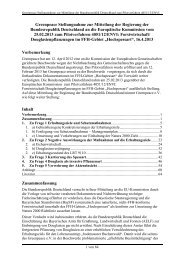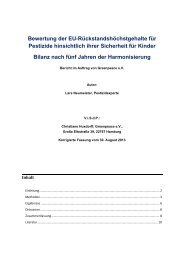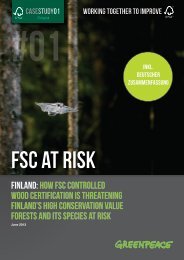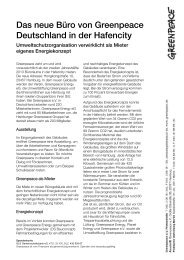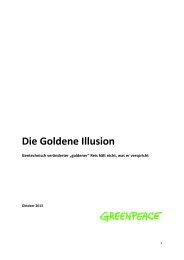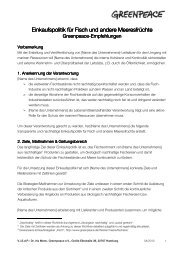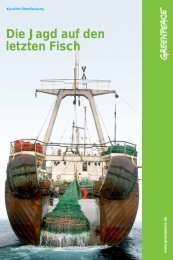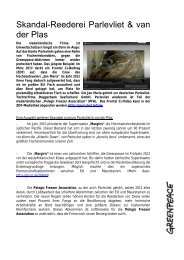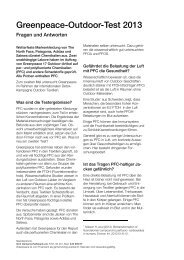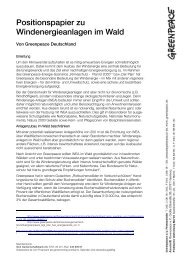Consuming Canada's Boreal Forest: The chain of ... - Greenpeace
Consuming Canada's Boreal Forest: The chain of ... - Greenpeace
Consuming Canada's Boreal Forest: The chain of ... - Greenpeace
Create successful ePaper yourself
Turn your PDF publications into a flip-book with our unique Google optimized e-Paper software.
50<br />
Appendix A:<br />
Alternatives to<br />
Ancient <strong>Forest</strong><br />
Products<br />
Comparison <strong>of</strong><br />
100% Virgin <strong>Forest</strong><br />
Fibre Copy Paper to<br />
100% Post-consumerRecycledcontent<br />
Copy Paper,<br />
Per One Ton <strong>of</strong><br />
Paper Use<br />
Compared to virgin paper,<br />
recycled paper:<br />
<strong>Greenpeace</strong><br />
Recycled and Reclaimed <strong>Forest</strong> Products<br />
Buying forest products made with recycled materials helps relieve pressure on ancient<br />
woodlands like the <strong>Boreal</strong> <strong>Forest</strong>. Despite the large increase in demand for recycled products,<br />
fibres from virgin forests continue to make up approximately two-thirds <strong>of</strong> the pulp that<br />
goes into papers made at North American paper mills. 1 Paper produced from recycled fibre<br />
uses less water and energy than virgin-fibre paper. Importantly, paper from recycled fibre<br />
causes less greenhouse gas emissions than virgin-fibre paper. High-quality recycled fibre is<br />
widely available for books, newspapers, copy and specialty papers, catalogues and magazines.<br />
It is also increasingly possible to recycle or reclaim building materials. Building construction<br />
constitutes 40 per cent <strong>of</strong> the timber used in the United States each year and modern<br />
wooden buildings not only use large amounts <strong>of</strong> timber but are <strong>of</strong>ten less energy-efficient<br />
and more expensive to build. Alternatives in the building sector include increasingly popular<br />
earth-based and agricultural fibre materials, and a growing number <strong>of</strong> engineered products<br />
made from organic materials and recycled materials.<br />
Wood entering landfills can also be recuperated and a growing number <strong>of</strong> mills are now being<br />
built to capture this wood stream and recycle it into medium-density fibre panel boards.<br />
100% Virgin 100% Post-consumer Savings (per ton)<br />
Wood Use 2,722 kg 0 tons 2,722 kg (saves 24 trees)<br />
Total Energy 11.14 watt hour 6.45 watt hour 4.98 watt hour<br />
Greenhouse Gases 2,581 kg CO 2 1,625 kg CO 2 956 kg CO 2<br />
Wastewater 72,210 litres 39,080 litres 33,120 litres<br />
Solid Waste 1,033 kg 524 kg 510 kg<br />
Source: Environmental Paper Network, Understanding Recycled Fibre (June 2007).<br />
Non-wood Pulp and Paper Products<br />
Forty percent <strong>of</strong> the world’s industrial wood use is for paper and other pulp products.<br />
Yet in many regions <strong>of</strong> the globe, the majority <strong>of</strong> paper products are made from non-timber<br />
sources such as cereal straw. Agricultural fibres such as wheat and flax straw are also used<br />
in paper. North America has primarily a specialty and niche market production <strong>of</strong> non-wood<br />
pulp and paper, while China produces over half <strong>of</strong> its paper using pulp from rice, hemp,<br />
bamboo and wheat crops. Like the different tree species, each kind <strong>of</strong> crop has a different<br />
fibre length and produces different paper qualities<br />
• Reduces demand on forests<br />
• Uses less total energy<br />
• Produces fewer toxic releases<br />
• Saves water<br />
• Reduces waste that otherwise must<br />
be landfilled or incinerated<br />
• Has a fibre efficiency rate <strong>of</strong> more than 70 per cent,<br />
compared to 23–45 per cent for Virgin papers<br />
<strong>Consuming</strong> <strong>Canada's</strong> <strong>Boreal</strong> <strong>Forest</strong>: <strong>The</strong> <strong>chain</strong> <strong>of</strong> destruction from logging companies to consumers



